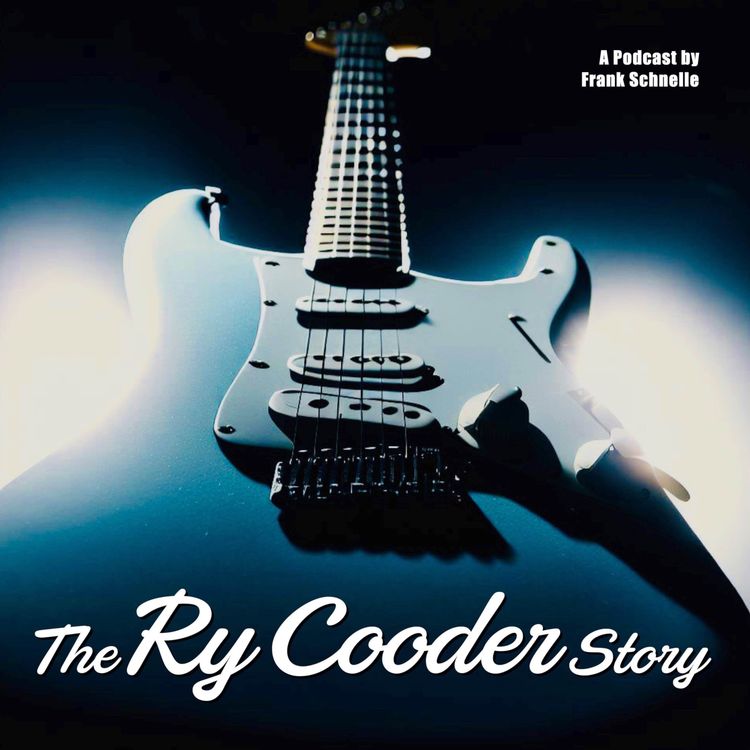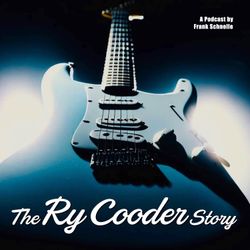Share

The Ry Cooder Story
BONUS Taj Mahal (1968)
In August 1967, a year after the Rising Sons disbanded, Taj Mahal recorded his self-titled debut album. It has long been considered one of the great blues albums. And Ry Cooder was on board! He played rhythm guitar and mandolin on five of the album's eight tracks. This bonus episode of The Ry Cooder Story takes a look at the production, the songs, and the aftermath.
This podcast frequently uses small snippets of musical recordings in podcast episodes for educational, review, and commentary purposes. In all cases, without exception, we believe this is protected by fair use in the U.S., fair dealing in the U.K. and EEA, and similar exceptions in the copyright laws of other nations. No more of the original than necessary is used, and excerpts are edited into long-form narratives, making the use transformative in nature.
Written, produced and edited by Frank Schnelle
Theme and background music by Chris Haugen
Follow us on Facebook, Instagram, Tik Tok and YouTube
Support us on Patreon
More episodes
View all episodes

Trailer
04:33||Season 1, Ep. 0We are excited to introduce you to a new podcast: The Ry Cooder Story, a podcast dedicated to the music, films and career of slide guitar master Ry Cooder. In this short message, you will learn about the concept and creation of the podcast.
1. 01 Beginnings
35:33||Season 1, Ep. 1Ry Cooder was an early starter. He got his first guitar at the age of four, was playing the records of his favorite blues musicians by the age of twelve, and was performing on stage at the famous folk club The Ash Grove by the age of fifteen. This episode describes his childhood and youth up to his first gigs with Jackie DeShannon and Pamela Polland.This podcast frequently uses small snippets of musical recordings in podcast episodes for educational, review, and commentary purposes. In all cases, without exception, we believe this is protected by fair use in the U.S., fair dealing in the U.K. and EEA, and similar exceptions in the copyright laws of other nations. No more of the original than necessary is used, and excerpts are edited into long-form narratives, making the use transformative in nature.Written, produced and edited by Frank SchnelleTheme and background music by Chris HaugenAdditional background music The Mini VandalsFollow us on Facebook, Instagram, Tik Tok and YouTubeSupport us on PatreonAsh Grove live recordings at https://www.wolfgangs.comRy Cooder on Big Joe Williams at https://youtube.com/watch?v=c98Jv3tCWTc
2. 02 Rising Sons
37:23||Season 1, Ep. 2The Rising Sons, featuring Ry Cooder and Taj Mahal, were ”one of the great what-might-have-been stories of Sixties rock“ (Rolling Stone magazine) and some “pretty hot shit back in ’65 and ’66 when they were holding forth in the clubs on the Sunset Strip“ (nodepression.com). It's a dazzling tale of an early fusion of pop and blues music, of high hopes and narrow failures, of rather different styles and sensibilities that ultimately didn't mesh. Nevertheless, the Rising Sons became the stuff of legend.This podcast frequently uses small snippets of musical recordings in podcast episodes for educational, review, and commentary purposes. In all cases, without exception, we believe this is protected by fair use in the U.S., fair dealing in the U.K. and EEA, and similar exceptions in the copyright laws of other nations. No more of the original than necessary is used, and excerpts are edited into long-form narratives, making the use transformative in nature.Written, produced and edited by Frank SchnelleTheme and background music by Chris HaugenAdditional background music by Purple Planet Music, The Mini VandalsFollow us on Facebook, Instagram, Tik Tok and YouTubeThe Ry Cooder Story WebsiteSupport us on PatreonRising Sons live recordings at https://www.wolfgangs.comRising Sons history at http://brunoceriotti.weebly.com/the-rising-sons.html
3. 03 Beefheart, Stones & Other Sessions
52:34||Season 1, Ep. 3After the Rising Sons disbanded, Cooder quickly became a sought-after session musician. His bottleneck sounds were new and unique at the time. No one was playing like him, and many had never heard such sounds before. In 1967, he featured prominently on Captain Beefheart’s album „Safe As Milk“. In 1968 and ‘69, he contributed to several albums and side projects of the Rolling Stones.This podcast frequently uses small snippets of musical recordings in podcast episodes for educational, review, and commentary purposes. In all cases, without exception, we believe this is protected by fair use in the U.S., fair dealing in the U.K. and EEA, and similar exceptions in the copyright laws of other nations. No more of the original than necessary is used, and excerpts are edited into long-form narratives, making the use transformative in nature.Written, produced and edited by Frank SchnelleTheme and background music by Chris HaugenFollow us on Facebook, Instagram, Tik Tok and YouTubeThe Ry Cooder Story WebsiteSupport us on Patreon
4. 04 Ry Cooder (1970)
45:36||Season 1, Ep. 4After signing with Warner Bros. in 1969, Ry Cooder released his self-titled debut album in 1970. Featuring Cooder classics such as "Do Re Mi," "Alimony" and "Dark Is The Night," it's the first in a long line of solo masterpieces in which he uniquely reimagines old blues, Dust Bowl ballads and obscure rock 'n' roll.This podcast frequently uses small snippets of musical recordings in podcast episodes for educational, review, and commentary purposes. In all cases, without exception, we believe this is protected by fair use in the U.S., fair dealing in the U.K. and EEA, and similar exceptions in the copyright laws of other nations. No more of the original than necessary is used, and excerpts are edited into long-form narratives, making the use transformative in nature.Written, produced and edited by Frank SchnelleTheme and background music by Chris HaugenAdditional background music The Mini VandalsFollow us on Facebook, Instagram, Tik Tok and YouTubeThe Ry Cooder Story WebsiteSupport us on PatreonRy Cooder promo video at https://www.youtube.com/watch?v=QelyELSju7M&t=1s
5. 05 Into the Purple Valley (1972)
56:32||Season 1, Ep. 5After covering important session work from 1970-71, including Little Feat, Crazy Horse, and numerous singer-songwriters, this episode introduces Cooder's next solo album, 1972's Into The Purple Valley. It's another masterpiece with classics like Money Honey, On A Monday and Vigilante Man.This podcast frequently uses small snippets of musical recordings in podcast episodes for educational, review, and commentary purposes. In all cases, without exception, we believe this is protected by fair use in the U.S., fair dealing in the U.K. and EEA, and similar exceptions in the copyright laws of other nations. No more of the original than necessary is used, and excerpts are edited into long-form narratives, making the use transformative in nature.Written, produced and edited by Frank SchnelleTheme and background music by Chris HaugenAdditional background music The Mini VandalsFollow us on Facebook, Instagram, Tik Tok and YouTubeThe Ry Cooder Story WebsiteSupport us on PatreonRylanders Website http://www.rylanders.free-online.co.uk/index.html
6. 06 Boomer's Story (1972)
37:53||Season 1, Ep. 6On his third album, as on his previous recordings, Ry Cooder presents the result of a musical treasure hunt that is also a journey through time. Boomer's Story (1972) looks to masters like Sleepy John Estes and Skip James, but also to younger, lost and neglected pieces of American folk and blues. Episode 6 of the podcast also introduces many Cooder sessions from 1972-73.This podcast frequently uses small snippets of musical recordings in podcast episodes for educational, review, and commentary purposes. In all cases, without exception, we believe this is protected by fair use in the U.S., fair dealing in the U.K. and EEA, and similar exceptions in the copyright laws of other nations. No more of the original than necessary is used, and excerpts are edited into long-form narratives, making the use transformative in nature.Written, produced and edited by Frank SchnelleTheme and background music by Chris HaugenFollow us on Facebook, Instagram, Tik Tok and YouTubeThe Ry Cooder Story WebsiteSupport us on Patreon
7. 07 Paradise And Lunch (1974)
45:10||Season 1, Ep. 7On Paradise And Lunch (1974), Cooder made several fundamental changes. First, he said goodbye to farmer tunes and dustbowl blues. Second, he worked on the songs more thoroughly in advance and planned the recordings much more carefully. And third, he used male backup singers for the first time, a trick that would come to define Cooder's style. This episode of the podcast covers the entire album as well as several live performances from the early ‘70s.This podcast frequently uses small snippets of musical recordings in podcast episodes for educational, review, and commentary purposes. In all cases, without exception, we believe this is protected by fair use in the U.S., fair dealing in the U.K. and EEA, and similar exceptions in the copyright laws of other nations. No more of the original than necessary is used, and excerpts are edited into long-form narratives, making the use transformative in nature.Written, produced and edited by Frank SchnelleTheme and background music by Chris HaugenFollow us on Facebook, Instagram, Tik Tok and YouTubeThe Ry Cooder Story WebsiteSupport us on PatreonRy Cooder Live At The Record Plant: https://www.youtube.com/watch?v=O3Dtlc3KwCk